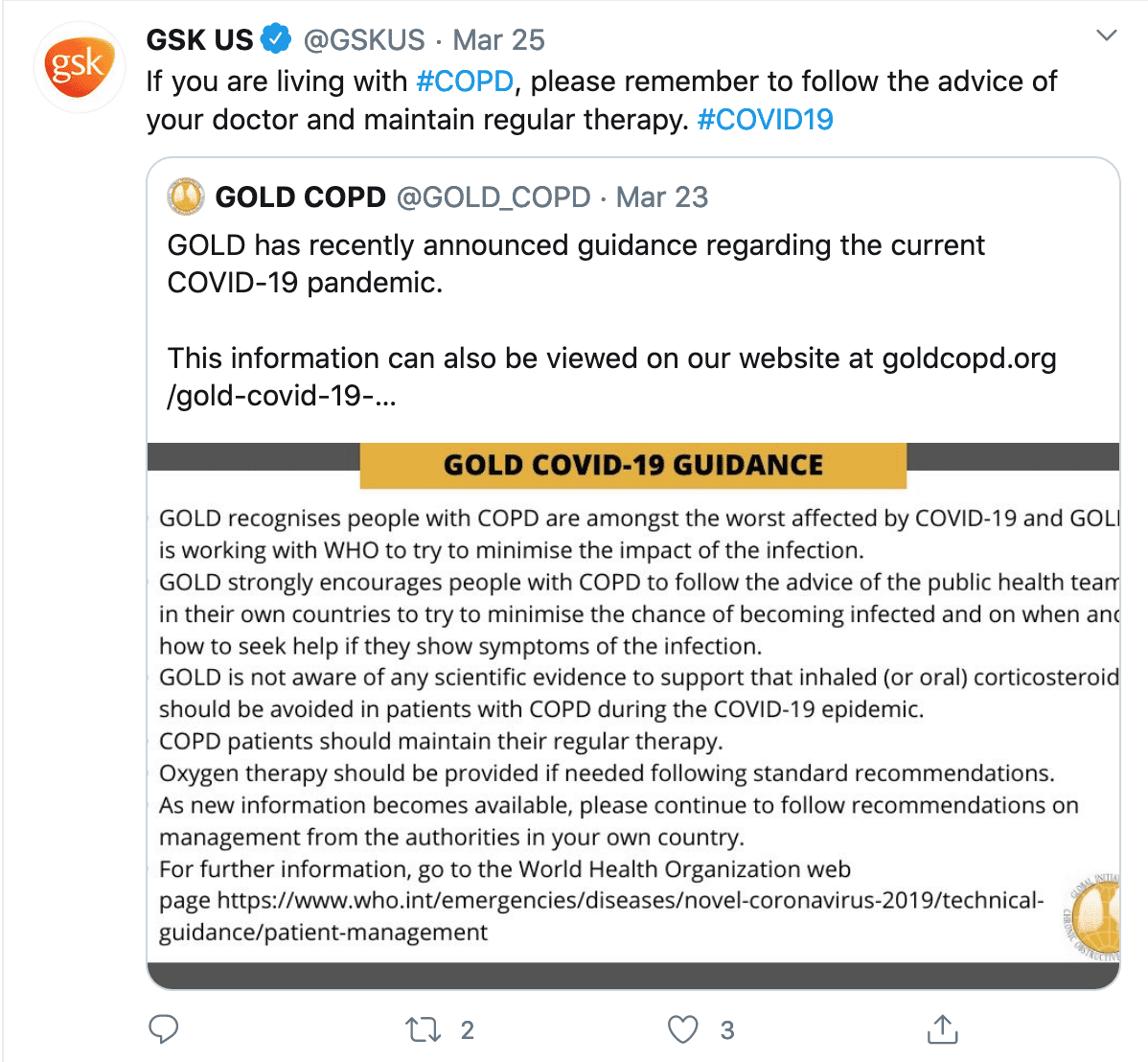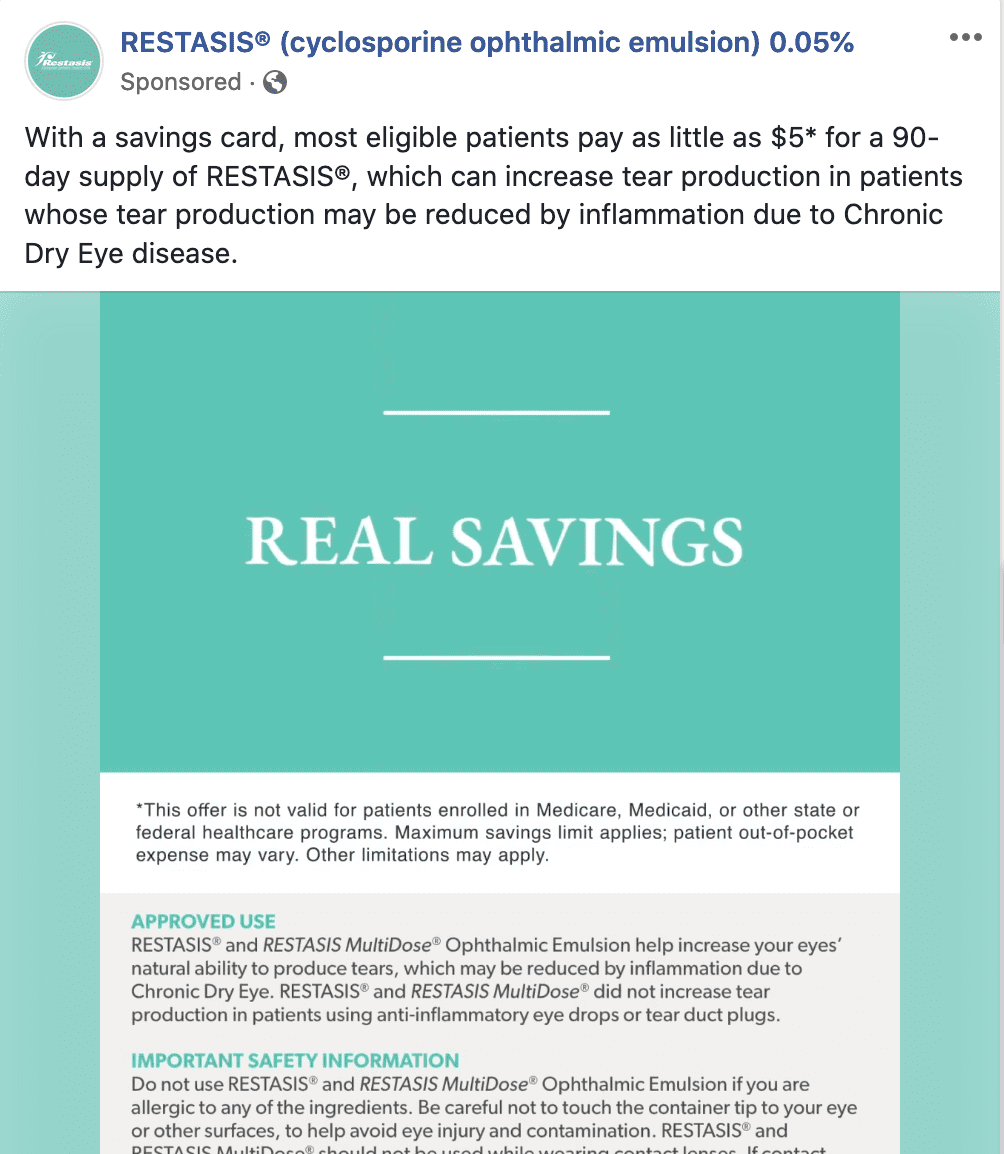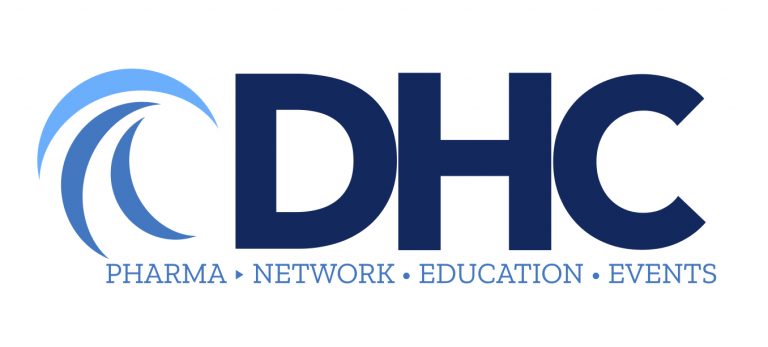Article: Social Media Trends - March 2020
By Christine Franklin, DHC
Social Media Considerations for Pharma During the COVID-19 Crisis
It’s an unprecedented time. The COVID-19 global pandemic has reshaped everything about our daily lives, including our social media experience. While social media has always been an important topic for DHC members and readers, it’s critical to understand what’s happening now with social media trends and help pharma marketers know what the right role is today and in the coming weeks.
Our social media feeds, whether Twitter, Facebook, Instagram or even LinkedIN are overwhelmed with #coronavirus related content, memes for #quarantinelife and advice on how to suddenly work-from-home and homeschool all at the same time. According to PEW Research, 74% of US adults visit Facebook at least once a day. Mixed into the tips for keeping kids quiet during conference calls and how to avoid the #quarantine15, there are real and serious threads about the intersection of managing one’s health and coronavirus.
Parents of children with complicating conditions, caregivers of aging parents, and patients with chronic conditions are all looking for trustworthy information on how COVID-19 might impact them personally given their unique situation. Yet in Edelman’s recent special report on “Trust Barometer on COVID-19, only 26% of those surveyed trust the information they see on social media, especially in regard to the current global pandemic. Meanwhile, a full 78% of respondents expect businesses to act to protect employees and the community.
The DHC interviewed members and our advisory board to best understand where pharmaceutical companies, brands, and marketers fit into this conversation. To start out, we all agree that this is not a time to go silent on social media. However, it is as important as it has ever been to be authentic and conscious of the conversational environment in which you are entering.
RxEdge’s CEO, Nathan Lucht offered his take on the Edelman Report and what it should mean for pharma marketers:
Marketers in the medical media space have a unique opportunity to lead in an uncertain time and work to disseminate timely, accurate information through channels people frequent to get their news. In a time when 57% of surveyed people said they worried that the media they use had untrustworthy information and only 29% trusted social media in general, medical marketers should make every effort to publish accurate, factual, and timely information in order to help curb the spread of the virus because they are one of the most trusted sources of information right now.”
1. Be Authentic
We believe COVID-19 will be a catalyst for the significantly increased uptake of virtual or tele medicine and by providing women that option to seek care, we’re allowing her an opportunity to access a conversation with a healthcare provider. We know that many women do not put themselves on the top of the priority list but in times like these, self-care is more critical than ever. Sharing information about how women can continue to seek out consultations via virtual medicine through our paid social initiatives is critical to how we are navigating the current environment.
Overall, whether it’s via social or other channels, it’s important for brands to remain true to themselves and their own “north star” during this global crisis. Ours is ensuring that we ignite a fire in women and empowering them to seek treatment that they need and deserve. We’re continuing to explore other approaches to supporting our patients through this difficult time and to ensure that she is able to access therapies to treat conditions she may be experiencing.”
As Meghan explained, marketers charged with social media messaging at this time need to ensure that they are first and foremost considering the patient or caregiver’s experience. Patients may be uniquely concerned about access to samples, the cost of medications on a suddenly reduced budget, or how much medication for a chronic condition they need to have in reserve. Messages relating to these topics might include details of coupon programs or referring to publicly available resources.

GSK has been several of these types of post from their @GSKUS twitter handle: pointing followers who have concerns about asthma or COPD and COVID-19 to CDC videos and posts from the Global Initiative for Chronic Obstructive Lung Disease (@GOLD_COPD). It’s recommended that marketers evaluate the right mix of sharing resources you already have on hand that would be helpful for patients or caregivers now and using your online voice to help those who need it find the right information produced by other reputable sources.
The risk in not striking the right tone and authenticity is cautioned by Zoe Dunn, Founder of the Hale Advisors:
“The one thing that I would say, is that this should really force people to think about the content they are placing in social media, especially that which is promotional in nature. As we are so absorbed with information around the virus, it’s pretty hard to cut through that with a promotional message. There is a very real risk of sounding insincere and even slightly callous or redundant. This is something we have been warning clients about for many years – not sounding robotic in two-way dialogue, being meaningful and having something of value to provide. Abbott has been doing a great job of it with their Rapid Testing release, which only proves that later point. Brand teams may want to do a lot more work around comforting their patients and being useful in this time of crisis. I’ve also seen brands proactively driving to tele-medicine, which is a win in many ways.”
In addition to social media networks like Facebook and Twitter, large social media populations also exist in condition-specific online patient groups, like the ones managed by social network MyHealthTeams. In virtual communities like these, understanding the impact of COVID-19 and the need for reliable information are further amplified. As Michelle Cox explained “we’re seeing weekly registrations from our social channels surge 400%, and the email open rates for COVID-19 related messages are well over 200% the average. These data points just underscores how hungry people are for authentic connection and trusted information during this time.” In order to help meet this need, resources specific to the chronic condition as it relates to COVID-19 are being produced and shared, such as this one, which helps COPD sufferers discern the difference between a COPD flare and coronavirus symptoms.
2. Be Conscious of the World Around You
If you are responsible for social media messaging on behalf of a pharma brand or corporate account and you haven’t already done so, you should immediately review your social media messaging to ensure that you are not inadvertently appearing tone-deaf to the world around us. While stand-out pharma campaigns have come a long way from the days of happy people walking through meadows with an adorable dog, there are still campaign messages that may need to be paused in light of the required social distancing.
Klick Health’s Senior Director of Social Media, Brad Einarsen, offered this advice in practical terms “Posts and ads that include images of, or text that discusses travel, large gatherings, visiting restaurants, bars or popular attractions, and people touching (hugging, kissing, shaking hands) should be paused for the duration of the pandemic. When providing content for your patients on sensitive issues, be careful to balance your approach with respect to both emotional connections when people cannot be together and loneliness which might be exacerbated at this time.”
Marketers may want to also focus their communications on ways in which they can both drive adherence and help meet real needs felt by patients at this time.

With a record number of Americans filing for unemployment, prescription drug costs will become suddenly unaffordable for many households. Coupon or copay programs should be highlighted and communicated clearly and compassionately. Delivering this information to the right audience is especially critical as an ever-increasing number of physicians’ offices have had to temporarily close their doors. Consumers are going to be seeking alternative resources to fill the gap created by more limited physician access.
Speaking as the Director of Health and Wellness for Twitter, Lisa Bookwalter added context:
“What people are really seeking right now is access to credible, real-time information and now more than ever, there’s a hunger to find creative ways to connect with each other. Twitter is the space where people are finding all of those things. The humanity that is fueling us as a global community during this fight against the virus is on full display on Twitter – from a neighborhood singing together during quarantine in Italy to updates from the WHO. It is a tremendous opportunity for pharma.”
So, while there are still opportunities to engaged with a branded message in this environment, Zoe Dunn’s advice bears repeating: “As we are so absorbed with information around the virus, it’s pretty hard to cut through that with a promotional message. There is a very real risk of sounding insincere and even slightly callous or redundant.” The short-term win may be closer to the example provided by major pharma brands on social channels today. In addition to providing advice on the impact of COVID-19 on pre-existing health conditions, many corporate channels are driving awareness of their contributions during the crisis. Whether Novartis sharing news of the donated 130 million doses of hydroxychloroquine or AstraZeneca, Merck, and others joining other corporations in donating desperately needed N95 masks and other supplies.
In addition to keeping a close eye on the messaging from your brand or company, you may also want to be listening to how you are mentioned on social channels. Liz McShea, Associate Director, Social Media, CMI/Compas points out “Social listening takes on even more importance today. Actively listening to the conversations occurring on social channels to best understand the concerns and issues of our consumer and HCP audiences is an actionable way to ensure that messaging and media plans are adjusted as necessary and tailored to specific disease states and brands, as all are uniquely impacted. Gaining real-time insights allows brands to be aware of sensitive issues surrounding their issues and demonstrate an understanding to their audiences.”
In this time of global solidarity to limit the loss of lives due to COVID-19, participating in the conversation by sharing important and useful information in an authentic way can be a meaningful way to do your part as a marketer. We look forward to reporting back in the coming months on all the ways that pharma companies and brands fulfilled needs in a way only they can.
